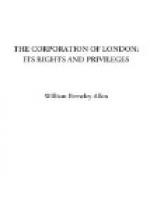The Law Courts.
With characteristic love of fair play, our ancestors laid it down as a leading principle, that “justice should be administered at every man’s own door, in the presence of his neighbours.” It is, indeed, a primary element of good government, that the dispensation of justice should be prompt and inexpensive, and without favour of persons. With the exception of the City of London, however, and a few other privileged places, the local tribunals were gradually superseded through the centralizing action of the superior courts. But even in London the civic franchises have been seriously diminished through the ruling of those courts that the privilege claimed by the citizens to be sued only before their own local tribunals is confined to real, and does not extend to transitory actions.
The highest court of civic judicature was the Hustings Court, so called from the Saxon word hustings, signifying the “house of things,” or causes. It was presided over by the Lord Mayor and Sheriffs, but the proceedings were actually conducted, and judgment pronounced, by the Recorder. All real and mixed cases, saving ejectment, fell within the province of this court, which was held at Guildhall on every alternate Tuesday. This court, however, though not formally abolished, does not now sit, and all the business formerly transacted at it is transferred to the Lord Mayor Court and the City Small Debts Court. In ancient times, the registration of deeds, wills, and titles to land, belonged also to this court, and the record in the Hustings of a sale or purchase of lands was deemed a sufficient voucher. It has been suggested that, as the necessity of a proper system of registration of the sale or mortgage of real property is becoming daily more evident, the machinery for accomplishing that purpose is afforded by the Court of Hustings, so far, at least, as the City is concerned. Practically, the most important court, however, at the present day, is the Lord Mayor’s Court, or Court of Aldermen of the Outer Chamber.




